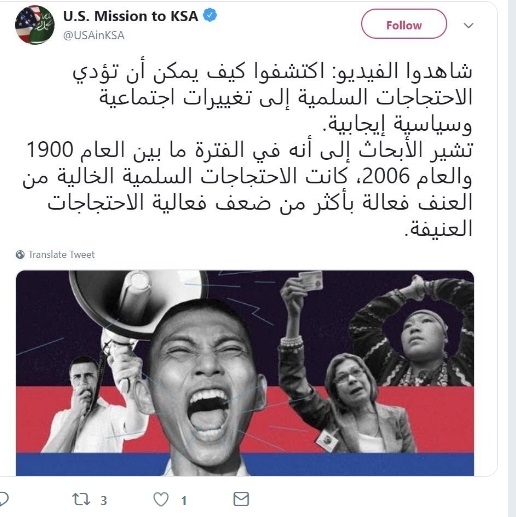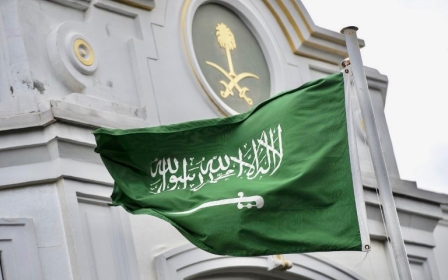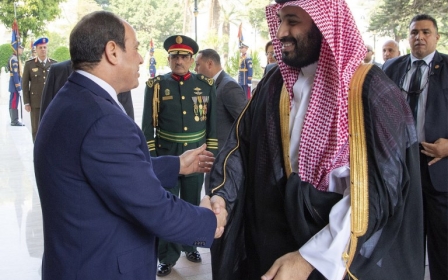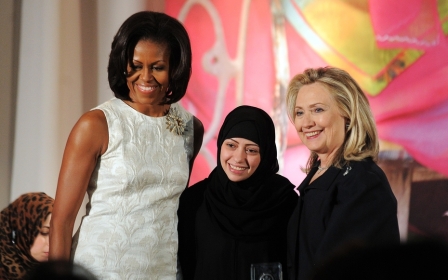EXCLUSIVE: US Saudi embassy shares video backing protests against 'brutal regimes'
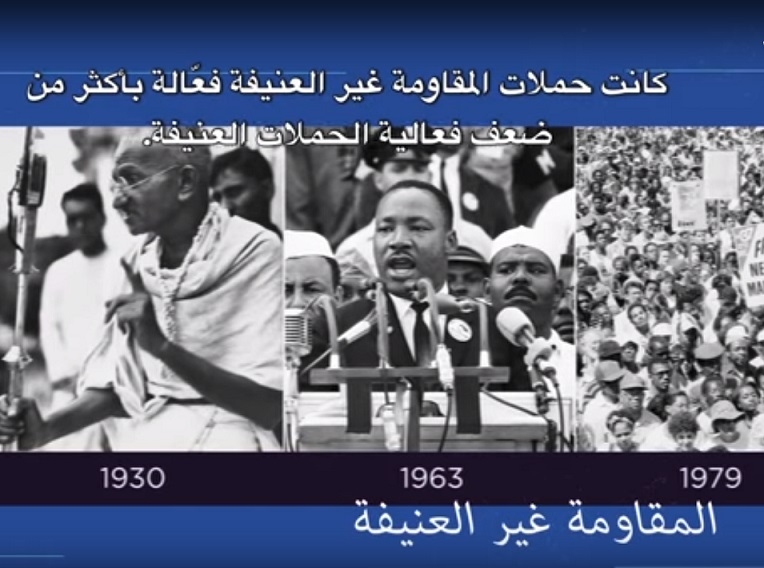
The US embassy in Saudi Arabia tweeted a video promoting peaceful protest as a path to "positive social and political changes," but the post was deleted on Friday after reporters asked whether the mission was encouraging Saudis to go out on the streets.
The shared video comes months after a tweet by the Canadian foreign ministry about the arrests of Saudi activists set off a diplomatic row between Ottawa and Riyadh that saw the Canadian ambassador expelled, a freeze by Saudi Arabia on trade and investment and the withdrawal of thousands of Saudi students.
Sent in August, the Canadian tweet expressed concern over the detention of civil society and women's rights activists.
This Wednesday, the US mission in Riyadh shared a video produced by the State Department with Arabic subtitles, promoting non-violent civil disobedience as a means "to guarantee a truly civil society".
"Even in oppressive, authoritarian conditions, protesters can tailor their campaigns to succeed," a voiceover says in the video, featuring a montage of archival photos of famous protest movements.
"When large, non-violent groups of people organise concentrated methods like protests, along with dispersed methods like boycotts or strikes, even the most brutal regimes have trouble stifling the movements indefinitely."
The video, shared by the embassy, is hosted on the website of ShareAmerica, which says it is part of the State Department's Bureau of International Information Programs.The bureau "works with US embassies and consulates in more than 140 countries to engage with people around the globe on US foreign policy and American society".
Middle East Eye contacted the State Department with questions about the video on Friday morning, including whether the embassy was encouraging Saudis to protest.
Within 20 minutes of a call confirming MEE's questions had been received, the US embassy's tweet was deleted.
Soon after, a State Department official responded: "The video in the post is part of the "Share America" series and portrayed historical events. The post was not an incitement or call to protest."
The State Department did not respond to a further email asking why the tweet was deleted.
'Absurd hypocrisy'
The deleted tweet comes with Washington's historically close alliance with Riyadh under intense scrutiny following the murder of Saudi journalist Jamal Khashoggi in the kingdom's consulate in Istanbul in October.
US President Donald Trump has made Saudi Arabia a focal part of his Middle East policy and pledged last month to "stand by" the kingdom and defended both King Salman and Saudi Crown Prince Mohammad bin Salman (MBS), who has been accused of ordering Khashoggi's murder.
This deleted tweet debacle is a perfect illustration of America's absurd hypocrisy. It just doesn't work to selectively promote human rights
- Sarah Leah Whitson, Human Rights Watch
"The United States intends to remain a steadfast partner of Saudi Arabia to ensure the interests of our country, Israel and all other partners in the region," Trump said in a statement on 20 November.
"It is our paramount goal to fully eliminate the threat of terrorism throughout the world!"
But US politicians have been less understanding, with the Senate unanimously adopting a resolution last week to hold MBS accountable for Khashoggi's murder.
On Friday, Dennis Horak, the former Canadian ambassador to Saudi Arabia who was expelled from the kingdom after his foreign ministry's tweet in August, told MEE he was surprised the video had been shared.
"You had the Senate resolution last week, holding MBS accountable for the murder, and then the Saudis reacted quite negatively to that, but said that they value the relationship," Horak said on Friday.
"It's a complete contrast to the massive overreaction they had with us this summer, but they are the United States and we're not."
Since he was named crown prince in June last year, MBS has projected himself as a reformer, lifting a long-standing ban on female drivers, opening cinemas for the first time and attempting to ween the kingdom off its reliance on oil.
But with the changes came a clampdown on critical voices, with hundreds of executives, former government officials, religious leaders and activists, including the women who first pushed for the driving ban to be lifted, imprisoned.
Bruce Riedel, a former CIA officer and scholar at the Brookings Institution, told MEE: "It’s very odd. The kingdom is more repressive under Crown Prince Mohammad Bin Salman than ever before: no dissent or protest is tolerated. It's baffling what the State Department was thinking."
Sarah Leah Whitson, executive director of Human Rights Watch's Middle East and North African Division, said the tweet apparently "slipped through the Saudi account".
"No doubt it was targeted for Iranians and Venezuelans, whose right to protest the US cares deeply about," Whitson told MEE.
"Protest rights for Saudis, Egyptians, Palestinians, and Bahrainis? Not so much. This deleted tweet debacle is a perfect illustration of America's absurd hypocrisy. It just doesn't work to selectively promote human rights.”
Several social media users were perplexed by the tweet.
Saudi journalist Hani Al-Abndi, whose Twitter biography says he lives in the US because there is no press freedom in the kingdom, asked if someone could "give us an explanation of the political joke that the US embassy have said".
"They encourage Saudi citizens to protest peacefully," he tweeted. "But Saudi citizens are scared to protest because they fear of being arrested and killed."
"I hope Saudi Arabia host the Russian and Chinese troops and expel the US ambassador," another tweeted.
This article is available in French on Middle East Eye French edition.
New MEE newsletter: Jerusalem Dispatch
Sign up to get the latest insights and analysis on Israel-Palestine, alongside Turkey Unpacked and other MEE newsletters
Middle East Eye delivers independent and unrivalled coverage and analysis of the Middle East, North Africa and beyond. To learn more about republishing this content and the associated fees, please fill out this form. More about MEE can be found here.


